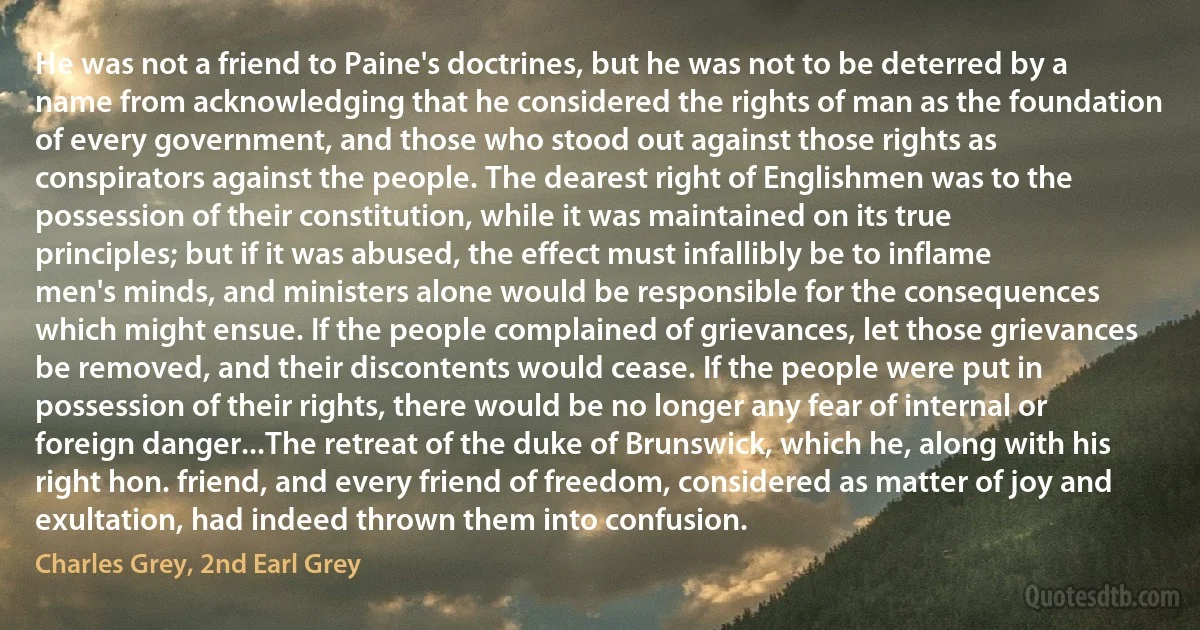
He was not a friend to Paine's doctrines, but he was not to be deterred by a name from acknowledging that he considered the rights of man as the foundation of every government, and those who stood out against those rights as conspirators against the people. The dearest right of Englishmen was to the possession of their constitution, while it was maintained on its true principles; but if it was abused, the effect must infallibly be to inflame men's minds, and ministers alone would be responsible for the consequences which might ensue. If the people complained of grievances, let those grievances be removed, and their discontents would cease. If the people were put in possession of their rights, there would be no longer any fear of internal or foreign danger...The retreat of the duke of Brunswick, which he, along with his right hon. friend, and every friend of freedom, considered as matter of joy and exultation, had indeed thrown them into confusion.
Charles Grey, 2nd Earl GreyRelated topics
acknowledging cease danger exultation fear foreign freedom friend government joy longer man matter might name people possession right stand throw while men's honRelated quotes
The Machine Age's commitment to cause and effect was the source of many dilemmas, including the one involving free will. At the turn of the century the American philosopher E. A. Singer, Jr., showed that science had, in effect, been cheating. It was using two different relationships but calling both cause and effect. He pointed out, for example, that acorns do not cause oaks because they are not sufficient, even though they are necessary, for oaks. An acorn thrown into the ocean, or planted in the desert or an Arctic ice cap does not yield an oak. To call the relationship between an acorn and an oak ‘probabilistic' or ‘non deterministic causality,' as many scientists did, was cheating because it is not possible to have a probability other than 1.0 associated with a cause; a cause completely determines its effect. Therefore, Singer chose to call this relationship ‘producer-product' and to differentiate it from cause-effect.

Russell L. Ackoff
From what can "ought" be derived. The most compelling answer is this: ethics must be somehow based on an appreciation of human nature - on a sense of what a human being is or might be, and on what a human being might want to have or want to be. If that is naturalism, then naturalism is no fallacy. No one could seriously deny that ethics is responsive to such facts about human nature. We may just disagree about where to look for the most compelling facts about human nature -n novels, in religious texts, in psychological experiments, in biological or anthropological investigations. The fallacy is not naturalism but, rather, any simple-minded attempt to rush from facts to values. In other words, the fallacy is greedy reductionism of values to facts, rather than reductionism considered more circumspectly, as the attempt to unify our world-view so that out ethical principles don't clash irrationally with the way the world is.

Daniel Dennett
Moreover, if we believe, as I do, that God's grace is extended to those who die in infancy or as small children, the death of these children was actually their salvation. We are so wedded to an earthly, naturalistic perspective that we forget that those who die are happy to quit this earth for heaven's incomparable joy. Therefore, God does these children no wrong in taking their lives.
So whom does God wrong in commanding the destruction of the Canaanites? Not the Canaanite adults, for they were corrupt and deserving of judgment. Not the children, for they inherit eternal life. So who is wronged? Ironically, I think the most difficult part of this whole debate is the apparent wrong done to the Israeli soldiers themselves. Can you imagine what it would be like to have to break into some house and kill a terrified woman and her children? The brutalising effect on these Israeli soldiers is disturbing.

William Lane Craig
The main burden of local defense against local attack, subversion, insurrection or guerrilla warfare must of necessity rest with local forces. Where these forces have the necessary will and capacity to cope with such threats, our intervention is rarely necessary or helpful. Where the will is present and only capacity is lacking, our Military Assistance Program can be of help. But this program, like economic assistance, needs a new emphasis. It cannot be extended without regard to the social, political and military reforms essential to internal respect and stability. The equipment and training provided must be tailored to legitimate local needs and to our own foreign and military policies, not to our supply of military stocks or a local leader's desire for military display. And military assistance can, in addition to its military purposes, make a contribution to economic progress, as do our own Army Engineers.

John F. Kennedy
My friend Sir G. Johnson subsequently became the leader of one of the two opposed methods of dealing with cholera. His was the " eliminative” view, namely, that there was mischief in the system that Nature strove to eliminate, so he prescribed castor oil to expedite matters; others took the exactly opposite view, consequently there was open war between the two methods. I read somewhere that one of Johnson's most fiery opponents considered the number of deaths occasioned by his method to amount to eleven thousand. Leaving aside all question of the accuracy of the estimate of this particular treatment, it is easy to see that when a pestilence lies heavily on a nation, the numbers affected are so large that a proper or improper treatment may be capable of saving or of destroying many thousands of lives. By all means, then, let competitive methods be tested at hospitals on a sufficiently large scale to settle their relative merits. Of this I will speak further almost immediately.

Francis Galton
